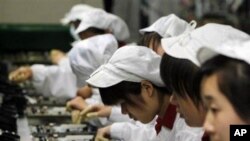Recent reports charging harsh working conditions in manufacturing plants in China are prompting Chinese Internet users to examine the nation's labor laws and the way they are implemented.
Two articles last week in The New York Times looked at U.S. technology giant Apple's supply chain in China. The reports detailed harsh working conditions at plants operated by Foxconn, the Taiwanese company that assembles most of Apple's products.
The Times described "onerous work environments and serious, sometimes deadly safety problems." It said employees work excessive overtime, in some cases seven days a week, and live in crowded dormitories.
Foxconn denies such conditions exist, and Apple chief executive Tim Cook has circulated an e-mail to employees saying any suggestion the company is uncaring is "patently false." The company did not return phone calls from VOA's Mandarin service.
The New York Times reports also quoted a former Apple executive saying the flexibility and diligence of Chinese workers makes it far more efficient for the company to conduct its manufacturing in China than in the United States.
Beijing-based financial magazine Caixin posted Chinese translations of the two reports on its website. From there, they circulated widely online, prompting hundreds of reader comments.
One anonymous reader said he was speechless to read that companies are drawn to China because it is easier to exploit Chinese laborers. “Devoid of conscience has suddenly become a point of superiority,” he wrote.
But Liu Mengqi, a professor at the Guangdong Academy of Social Science, argues that pressure from foreign companies has helped to improve Chinese working conditions, especially in the southern and coastal areas where the foreign-owned plants are concentrated.
“Standards like minimum wage, government inspections, and companies' auditing processes have increased dramatically,” says Liu, who advises the government and industries on corporate social responsibility. She adds that workers have become more aware of their rights.
“Now, the goal is to create a system that protects the rights of workers indiscriminately, regardless what sector or type of company they work in,” Liu says.
Lee Kai-fu, a former head of Google China, acknowledges Apple's efforts on behalf of its workers but says the company should do more.
“On one side [Apple] incessantly requests that suppliers provide a safe environment for the workers; on the other, it asks suppliers for the lowest price,” Lee writes on his microblog account, which is followed by more than 30 million people. He says the company should use more of its profits in “bettering the work environment, and save laborers.”
Since 2008, China has adopted new labor legislation, which -- on paper -- requires employers to provide unprecedented protection to their workers. But labor rights groups say implementation of the law has been slow.
Chen Baizhu, professor of economics at the USC Marshall School of Business and senior researcher at the Chinese Academy of Social Science, says the new law for the first time enables workers to sue their employers for contract violations. “The atmosphere in China now is that the government is leaning more than it did before towards labor [protection],” he says.
Chen says Chinese officials want the nation's economy to move toward better paying and more sophisticated jobs, a drive which should improve working conditions.
“If you look at the many local Chinese governments, what they have been doing in the past couple of years, is that they have been raising costs, enormously, to drive out labor intensive industries from their regions,” Chen says.
Chinese workers themselves may eventually tire of exhausting and repetitive factory work.
One 28-year-old Internet user said that after working in a factory for six years, he decided to open up a small business.
“The reason is that I saw no future there,” he says, advising young people against working in factories for too long. “It is most likely going to be a hopeless experience,” he says.
Strong Reaction to Reports on Chinese Manufacturing Practices




